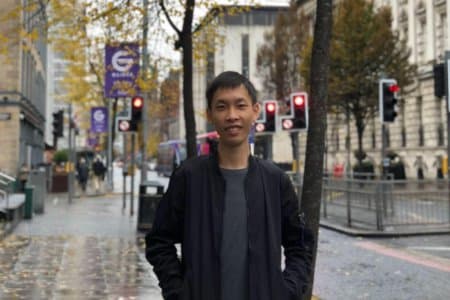
Fact: studying English Literature is one of the most useful things you can do for yourself — personally and professionally.
Only a few people would agree with me.
After all, most established professionals might lean towards more traditional degrees such as science, technology, engineering and mathematics (STEM).
Or “safer” degrees like law, business or economics — commonly known as degrees that offer “more flexible” job options among Asian families.
Others point towards the value of newer degrees like data science and analytics.
Don’t get me wrong — these are great choices if you’re passionate about them.
It’s, however, unfair to give them a higher priority over subjects like English Literature.
That’s because studying English literature trains in one of the most fundamental yet underrated professional skills: the ability to communicate effectively.

Visiting the Minack Theatre in Porthcurno, England. Most of the plays I studied in university were initially performed in open-air theatres like this. Source: Sofiya Shazal
Studying English Literature: My key reasons
I’m from Malaysia, a tiny country in Southeast Asia. When I was 18, I had no idea what I wanted to pursue at university — it seemed like such a big life decision that I wasn’t ready to make.
(To be fair, I still think 18 was too young for me to be making such decisions about the trajectory of my life — but that’s a debate for another day.)
My parents told me to focus on my strengths.
I enjoyed history and psychology, two subjects I took for my A-Levels. The subject I excelled in most, though, was English.
There are a few reasons for this.
Growing up, I loved reading and consumed endless amounts of sci-fi, fantasy and young adult fiction materials.
Because of this, I had a strong grasp of the language — which was reflected in my grades.
From then on, I delved into the different texts in classes. It was fascinating to explore various forms of prose and poetry.
What stood out to me was how we would communicate differently over time — and how it gives us, the reader, a deeper insight into another’s thoughts and feelings.
It was only natural for someone like me to be at uni studying English Literature.
Hence, I chose to do so at Queen Mary, University of London — a respected UK institution for the arts and humanities.

Visiting Stratford-Upon-Avon, where Shakespeare lived. Studying in England was wonderful as an English student, as literature was embedded into every aspect of life. Source: Sofiya Shazal
The best skills you learn from studying English Literature
Make no mistake: studying a subject like English Literature can be very, very challenging.
Suddenly, I was given two weeks to finish one text I’d previously spent a whole semester on.
I had four modules per semester. Each required me to look at different fictional and non-fiction texts.
These are the most important things I learnt.
I mastered the art of effective communication.
Communication isn’t just about structuring your sentences right or making sure you’ve spelt certain words correctly.
Yes, these are important — but they ignore the greater purpose of communication: to relay a message with clarity and purpose.
The key behind this? Understanding who you’re speaking to and how they might best receive that message.
Reading different texts got me exposed to many writing styles.
Each writer had their way of reaching their audience — through short sentences, long paragraphs, or sometimes, just two words on an otherwise blank page.
Still, the fact that I was studying published writers showed me that each form of writing connected with an audience in some way.
No one way of writing was “correct”. By being flexible and adaptable with your tone and language, however, you could effectively communicate with anyone.
What I wasn’t able to learn through reading, I practised by writing.
I wrote essays, commentaries, poetry and fiction both for and outside of my classes.
They each required me to employ a different style.
It is a valuable skill I still use today — as a writer, social media user, employee, and friend.

My study desk at university. Source: Sofiya Shazal
I learnt more about the world and society around me.
The beauty of English Literature is that it can be about anything — from war and history to archaeology, civilisation and culture.
I read about hundreds of different characters, each with their own backgrounds and interests.
When studying English Literature, you’ll spend a lot of time consulting texts about human nature.
The characters you’ll encounter will be varied — some are clearly good or bad, while others land somewhere in the middle.
For example, a book might put you in the shoes of a morally ambiguous character. They may commit certain crimes that, on the surface, seem horrendous.
By reading on, you’ll learn why a character behaved in a certain way.
Being in a reader’s shoes forces you to empathise in some way — no matter who the narrator is.
Through this, I was forced to put myself in an observer’s shoes. I learnt to take in the experiences and desires of others without relating them to myself.
At the same time, I learned about all manners of things — giving me a breadth of exposure to the world that I might not have experienced had I been a simple business or engineering student.
It made me look at society with more nuance.
I learnt how to think critically.
Studying English Literature often involves taking in a text, dissecting how it was written or presented, and forming an opinion around it.
Most of all, you’ll have to justify why you’ve formed your opinion with your reader. It requires a level of impartiality in considering that very text — which forms the very basis of critical thinking.
You have no choice but to look at a piece of work objectively and consider what it is saying by looking at the available facts and evidence.
It is a handy skill that I now employ in my everyday life. No longer do I paint situations in black and white.
Instead of villainising a certain ideology, I seek to understand it. Once I gain all the information possible, I’d form an opinion around it — but never before.
This, in my opinion, is the most valuable skill I gained out of my degree.
In today’s world, social media and cancel culture have warped our views about things, making us believe that one way of thinking is “right”.
Often, we rush to accept popular points of view because we fear being alienated if we don’t.
Being able to think critically removes that fear — giving us more power to form our opinions and make our own decisions.

The skills I’d learnt at university helped me during my career. Here, I’m pictured at the Malaysian Parliament as part of my short internship as a local journalist. Source: Sofiya Shazal
How a degree in English Literature boosted my professional prospects
I was worried that choosing English Literature would limit my choices after graduation. After all, my friends were studying more “practical” subjects like engineering, law, business and economics.
However, my English degree helped me more than I thought. Here are some ways in which it boosted my professional prospects.
It helped me in crafting my CV and cover letters.
Stepping out into the working world is scary. There’s a lot of competition — students who got all As, did more during their summer breaks, or have better connections.
As someone who has been studying English literature for three years, however, I had one distinct advantage: knowing how to craft my CV and cover letters well.
Every company is different. You’d think about their goals and what they want from a new hire.
Ask yourself: What does the hiring manager want to see in my application? What skills do they most value and what mindset do they operate in?
From there, you can tailor your CV and skills to suit the application.
As an English graduate, I could understand and address my audience effectively.
Side note, though: applying for jobs is definitely a learning process. I’m not an expert, but my English degree was a great help.
I’m able to write in a variety of different forms.
Understanding the tone of voice is a critical part of writing — even more so if you’re writing for different forms.
Writing out an article, for example, means you’ll have to be more aware of grammatical errors and the flow of your sentences.
Creating a social media post means using more emojis or internet slang.
Sending out a newsletter requires using persuasive and enticing language to prompt the reader to take action on something.
It widens my pool of knowledge.
As an English Literature student, I read so many different texts. I don’t read as much now — but that itch to seek out different opinions and forms of media still rests in my head.
Because of this, I now spend a lot of time reading articles, watching TED Talks and listening to podcasts.
They have a unique way of filling the gaps in my knowledge — from making me consider another perspective to deepening my understanding of a specific topic.
This growth mindset has helped me in more ways than I can count. I’m constantly pushing myself to go further and learn more, whether it is in the little steps or making tremendous progress.










